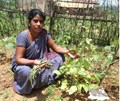
Dr. Trilochan Mohapatra, Secretary, Department of Agricultural Research and Education, GoI and Director General, Indian Council of Agricultural Research, New Delhi, visited ICAR-CRIJAF, Barrackpore & inaugurated the Exhibition Hall, Fibre Museum and the retting complex facility inside the institute premises.
ICAR-CRIJAF Showcases New Technologies & Varieties
ICAR-CRIJAF has established an exhibition hall to showcase the new varieties and technologies, among the stakeholders and farmers. The technologies, varieties and machineries have been well documented and displayed in the exhibition hall with attractive photographs, figures and models. The fibre museum has vast collection of all the natural fibres obtained from mandated crops like jute, mesta, roselle, sisal, ramie, flax and sun hemp.
Besides the museum has very diverse collection of diversified products like decorative, house hold materials, shopping bags, fancy bags, dresses and ornaments made from these natural fibers. The need-based technologies developed by the institute on improved varieties with higher productivity and finer quality, mechanization in jute farming and post-harvest processing, solar energy based slow moving water retting, liquid formulation of microbial consortium ‘CRIJAF SONA.
In-situ retting tank and eco-farming for obtaining high quality fibers for manufacture of export quality jute diversified products have been specifically highlighted and showcased in the exhibition hall. After the inauguration of the exhibition hall and the fibre museum, Dr. Mohatpatra told that such facilities are very important which give an insight in to the natural fibre crops, right from varieties, agro-technologies to the product development.
The centralized collections reflects the role and achievements of ICAR-CRIJAF and are very informative and useful for farmers, students, stakeholders associated with jute and allied fibre sector.
Inauguration of Developed Retting Complex of Institute
Later on, Director General inaugurated the newly developed retting complex of the institute. Retting in different models of retting tank and solar operated slow moving retting water facility were demonstrated to the dignitaries and farmers. Dr. Mohapatra expressed satisfaction and told that microbial consortium-mediated retting under free-flow water has substantial impact in obtaining best grade jute fibre required for JDP manufacturing.
He also suggested making the system full proof with analysis of proper economics. Such retting technologies are more economical in terms of better use of resources and efficient in terms of climate resilience. He also interacted with the women members of the SHGs trained by ICAR-CRIJAF on manufacturing of different diversified products from jute fibre.
Few progressive farmers also interacted with the dignitary and shared their experience in adoption and of CRIJAF technologies and its major advantages. Dr. Mohapatra also addressed the staff of ICAR-CRIJAF and congratulated the Director and staff of the institute for the recent developments.
The facilities created in the institute and were confident that the stakeholders will get benefited from the technologies and there will be growth in export of jute. He emphasized that various handicrafts and jute diversified products manufactured by Self Help Groups (SHGs)must reach better market facility for higher income and urged for up-scaling of jute based diversified products for export promotion.
Other dignitaries present in this occasion were Dr. J.K. Jena, Deputy Director General (Fishery Sciences), ICAR; Prof. B. S. Mahapatra, Vice Chancellor, BCKV, Kalyani, Dr. Anil Rai, Assistant Director General (ICT), ICAR; other Directors of ICAR institutes and officials from State Govt. Besides, seventy farmers and women SHG members also interacted with the Director General ICAR and other dignitaries.
In the beginning Dr. Gouranga Kar, Director, ICAR-CRIJAF welcomed the Director General, Indian Council of Agricultural Research and highlighted the major achievements of the institute. He stressed that solar energy based slow moving water retting model can be replicated on cooperative basis by farmers and the industries which are engaged in export of jute diversified products.
Creation of such facility will improve the availability of quality fibre needed for manufacture and export of jute diversified products. Dr Kar thanked the Director General, ICAR for his visit to the institute and ensured that the institute will further work for the benefit of the stakeholders in doubling the farmer’s income.
















